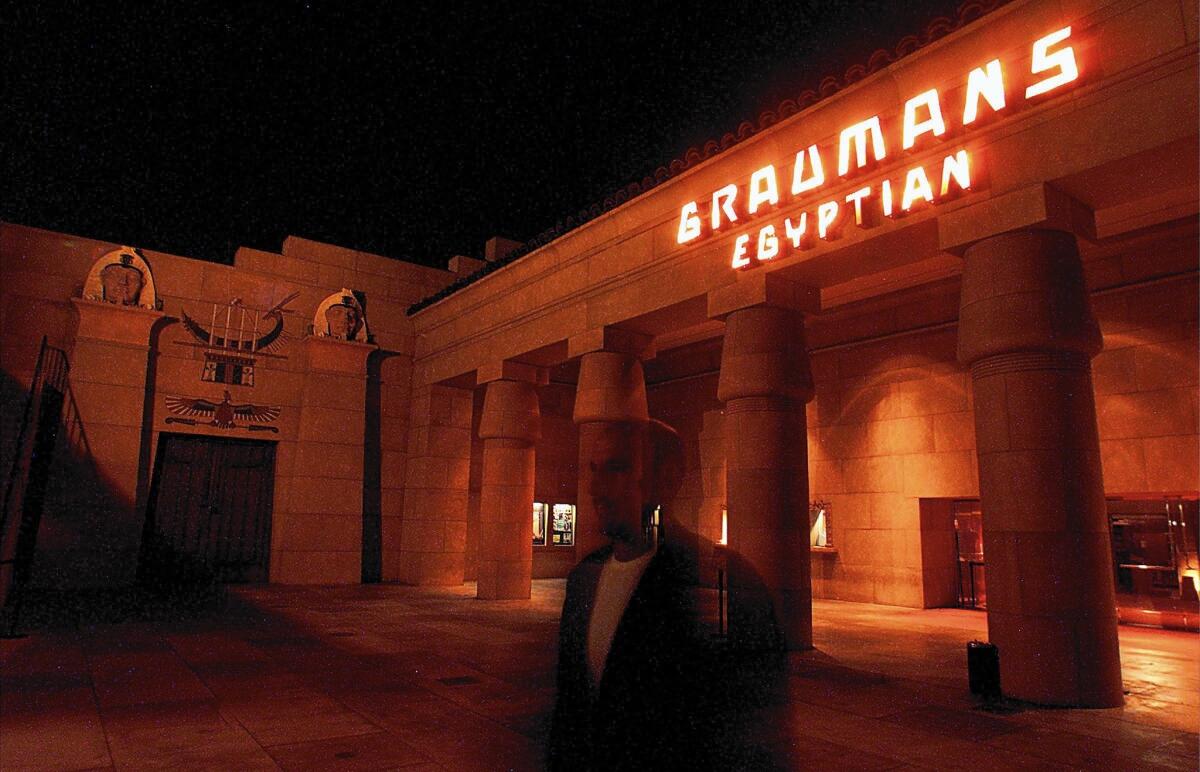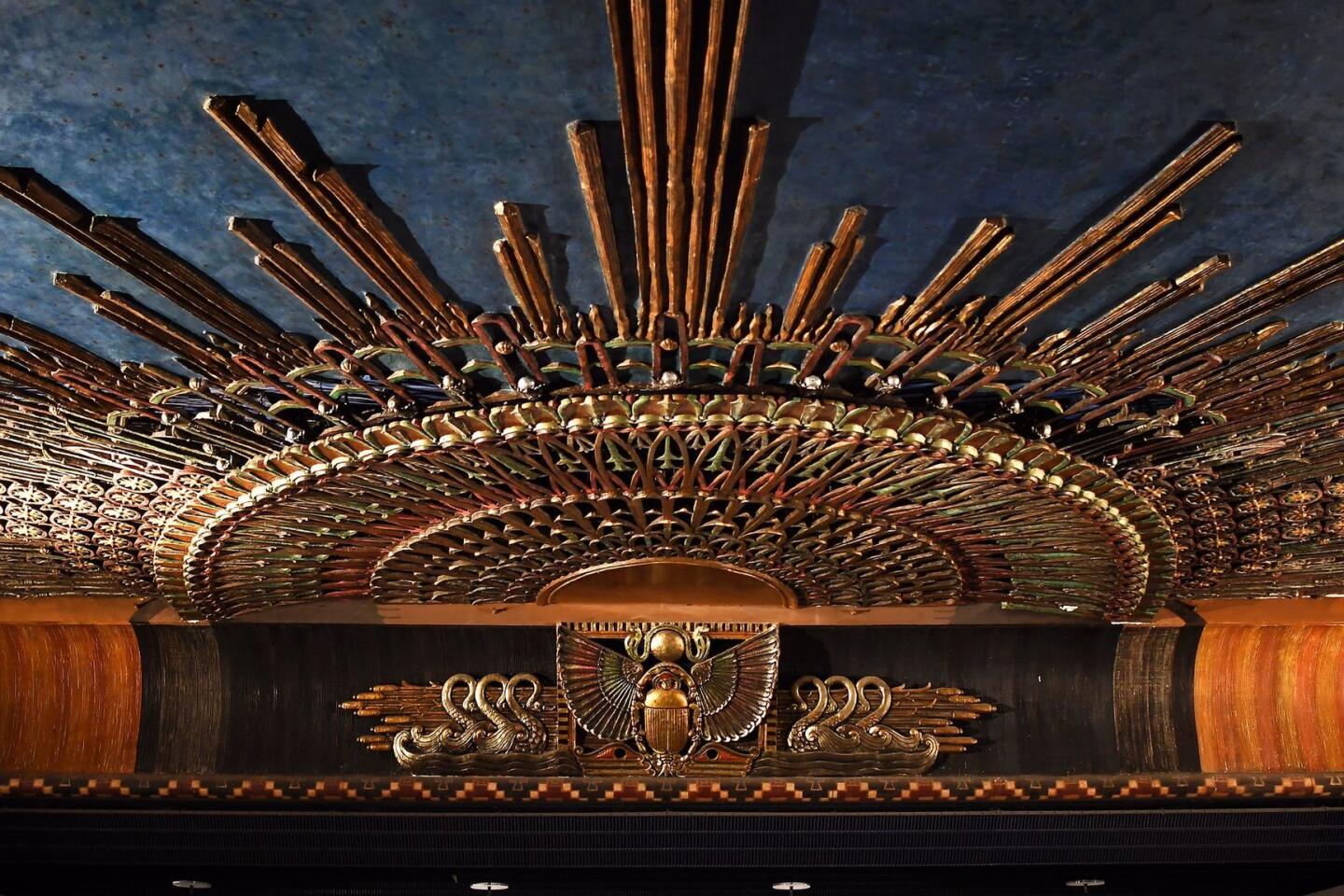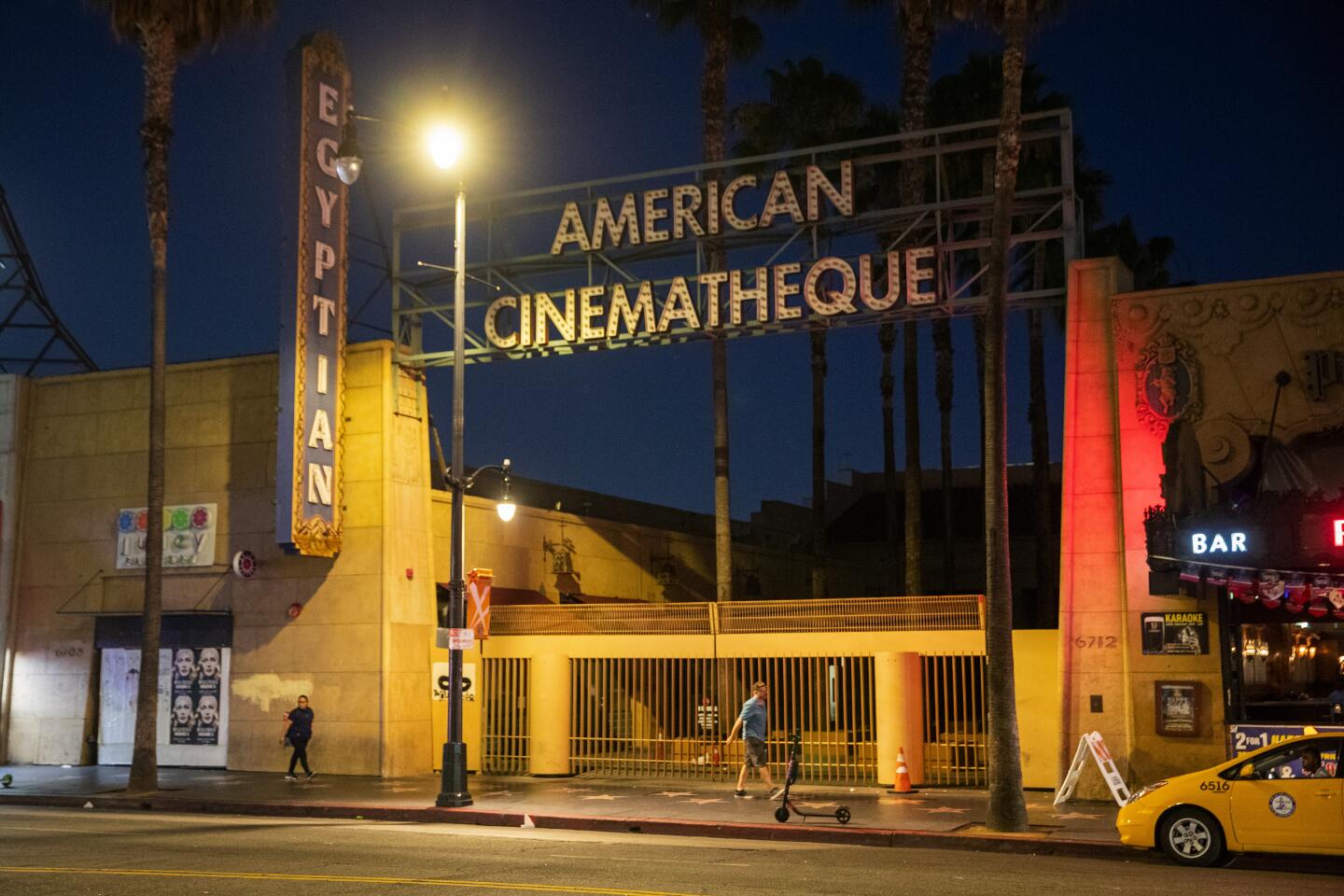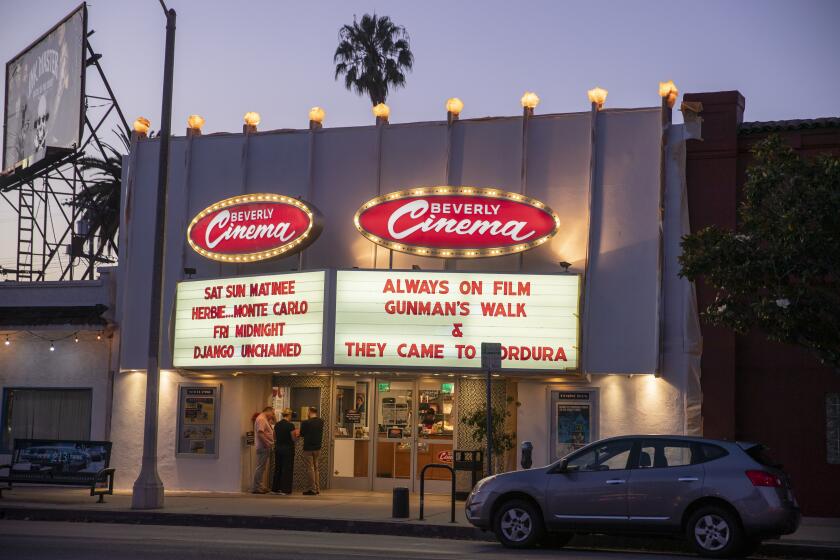What happens when Netflix buys Hollywood’s iconic Egyptian Theatre? It’s complicated

- Share via
North Hollywood-based librarian Christina Rice, 45, loves to see movies with her 9-year-old daughter at the Egyptian Theatre in Hollywood.
On a recent Friday afternoon, she trekked to the historic movie palace for a lively screening of the 1942 feature “Get Hep to Love,” where she sat with former child actress Cora Sue Collins, who starred in the picture. The screening, part of the annual Cinecon Classic Film Festival, was a special moment for Rice.
“To be in a theater like that on Hollywood Boulevard, with cinephiles just going crazy, and to be watching it with someone who was actually in the movie. ... Only in Hollywood,” she said.
But lately, Rice has been worried about the future of the beloved Egyptian. American Cinematheque, the nonprofit that has owned and operated the location for more than two decades, has been in protracted negotiations to sell the theater to an unlikely buyer: the streaming video giant Netflix Inc.
When the talks first surfaced in April, sources said discussions were going smoothly and they expected the transaction to close in the near future. Still, the proposed deal has faced some backlash, partly because the theater is a historic landmark that has served to benefit the public following an agreement with the city.
Netflix has declined to comment publicly about its plans for the Egyptian, because the negotiations are private. Acquiring the property would be a coup for the Los Gatos, Calif.-based company. With its faux-Egyptian facade and courtyard, the Egyptian is one of the most recognizable sites on Hollywood Boulevard. Opened by Sid Grauman in 1922, the theater is designated as a Los Angeles historic-cultural monument and is one of the few remaining repertory theaters in the city the film business calls home.
Sources close to Netflix and American Cinematheque say that the deal will benefit the nonprofit, the theater and Los Angeles’ community of classic and independent film lovers. The Cinematheque will continue to program historic movies, rarities and indie cinema on Fridays, Saturdays and Sundays, the organization has told its membership. Netflix, which has been investing billions of dollars into its own film and TV productions, is expected to use the location for screenings and premieres on weekdays.
What’s more, the proceeds from the sale should fund more programming by American Cinematheque, which has struggled financially over the years, and support a much-needed renovation to the theater, according to the organization’s chairman, Rick Nicita. Netflix is reportedly poised to pay tens of millions of dollars.
“Friday through Sunday, which are our main days by far, will remain the same,” Nicita said in an interview earlier this year, after the talks were made public. “The membership should be very happy. [This means] more opportunities, more events, and more good things in a renovated theater.”
Such assurances, however, have done little to allay the fears of some local film buffs and preservationists, who are concerned about what will happen after the classic theater is handed from the American Cinematheque, whose mission is to provide cinematic art to the widest possible audience on the big screen, to a for-profit corporation. What happens, for example, if Netflix changes its mind and decides it no longer wants to own a brick-and-mortar theater?
As Alamo Drafthouse lands in L.A., a look at other local theaters for the voracious, all-consuming movie lover
Some, including people close to the Cinematheque who spoke to The Times on condition of anonymity, have raised concerns about whether such a deal would conform to the group’s 1996 agreement with the Community Redevelopment Agency of the City of Los Angeles, which sold the theater to American Cinematheque for $1 and provided funds to restore it to its former status. Los Angeles preservationists Richard Schave and Kim Cooper, who run a tour company, have circulated a petition calling for greater transparency into the deal, and have asked the city to weigh in.
But city officials contend they have limited say in the matter. Tony Arranaga, communications director for Councilman Mitch O’Farrell’s office, said the city has no jurisdiction over the management of the Cinematheque, the disbursement of funds from the sale or what happens if Netflix decides it no longer wants to own the theater. The CRA was dissolved by the state of California in 2012 as part of Gov. Jerry Brown’s budget-balancing efforts. However, he said, the city can ensure that any modifications to the building conform to the U.S. Department of Interior standards.
“It is my understanding that the agreements between the [CRA’s designated successor agency] and American Cinematheque have expired,” Arranaga said. “The councilmember will work with any owner, existing or new, of the Egyptian Theatre to ensure that they are good stewards of this historic resource.”
Representatives for the local authority designated by the state to wind down the affairs of the CRA did not respond to requests for comment.
Then there’s the involvement of Netflix chief content officer Ted Sarandos, who has been a board member of the Cinematheque for years. Sarandos approached the Cinematheque about selling the Egyptian more than a year ago, but has recused himself from negotiations, people familiar with the matter said.
If it’s such a great thing, why does this all need to be shrouded in secrecy?
— Christina Rice, librarian
Some American Cinematheque patrons say paying members, who first learned about the potential sale from a report by industry trade publication Deadline, have been told little about the future of the Egyptian under Netflix. An email sent to members this summer noted “the impending sale of the Egyptian Theatre” and said that the Cinematheque will have an endowment for the first time. However, the newsletter did not mention Netflix’s involvement or the anticipated date of the sale.
“It’s a wait-and-see sort of situation,” said film studies professor Catherine Benamou, who teaches at UC Irvine and has attended screenings at the Egyptian. “The stated intentions are OK, but I really think it’s got to be a close working relationship with the cinephilic community of Los Angeles.”
Some in the film business say selling the Egyptian is a good idea. Studio sources, who have used the location for screenings, note that it could use some sprucing up, and it’s not unheard of for a major movie company to own and revive a classic cinema house. Walt Disney Co. owns and screens its oldies at El Capitan Theatre in Hollywood, for example. “It’s a neutral, at worst,” said one longtime studio insider who asked to remain anonymous to protect relationships. “If you consider the resources Netflix has, it should be a positive.”
If the deal goes through, it would be a noteworthy step in Netflix’s efforts to become an increasingly powerful force in the film business. Keeping the Cinematheque afloat would provide some much-desired goodwill among filmmakers for a company that is widely seen as a disruptor of traditional cinema.
Major movie chains, including AMC Theatres, have refused to show Netflix movies because the company gives cinemas a much shorter exclusive window than the 90-day average given to normal studio releases. Netflix plans to release its Martin Scorsese crime drama “The Irishman” in a limited number of theaters for several weeks before making it available on its popular streaming platform Nov. 27. Exhibitors largely declined to screen last year’s critical darling “Roma,” the black and white Alfonso Cuaron drama that won three Oscars, though not best picture.
It would also mark a new chapter for a theater that has been a fixture in L.A. since the early 1920s and has had multiple owners. Grauman built the theater five years before the opening of the more famous Chinese Theatre nearby. The Egyptian hosted the premiere of “Robin Hood,” starring Douglas Fairbanks, and also debuted Cecil B. DeMille’s 1923 silent film “The Ten Commandments.” The theater closed in 1992, having fallen far from its former glory under the ownership of United Artists Theatres. Los Angeles CRA bought the theater and the property for $1.7 million, as part of its mission to revitalize the long-neglected section of Hollywood.
After the Cinematheque took over, the theater, which was damaged in the 1994 Northridge earthquake, underwent a $15-million renovation, which included a $3-million CRA grant. The Egyptian reopened in 1998 with another gala screening of “The Ten Commandments.” The former 1,100-seat theater now houses a 616-seat auditorium and a 78-seat screening room named for Steven Spielberg. The nonprofit group was established in 1981 by the leaders of the L.A.-based Filmex film festival.
American Cinematheque, however, must still contend with the California attorney general’s office. American Cinematheque is required to submit a notice of the transaction to the attorney general before it sells the property. The office has not yet received that notice, a spokesman said.
The attorney general’s office has already been scrutinizing American Cinematheque’s operations. Earlier this year, the office notified the group that it had failed to submit an independent audit for fiscal 2017 as required by state law. In March, the Cinematheque sent a letter to Atty. Gen. Xavier Becerra’s office requesting an exemption to the audit requirement, citing lost data and a software failure. Two months later, Becerra’s office requested all correspondence between Cinematheque and independent auditors. Representatives of American Cinematheque did not respond to requests for comment on the probe, which was first reported by Los Angeles Business Journal. Becerra’s office declined to comment.
The pending sale of the Egyptian has already caused some headaches for people in the local film community, including Sylvia Minassian, founder of the Arpa International Film Festival. The festival has been hosted at the Egyptian Theatre for the last 14 years. However, she said, she received an email in July from American Cinematheque saying her organization would not be able to use the theater because of the upcoming renovation. She scrambled to find a new venue, landing on the considerably smaller American Legion Post 43 on Highland. The festival will take place there in early November.
“What upset me was, we had such a great relationship,” Minassian said. “We love the location so much and the filmmakers are in such awe of it.”
Rice, the librarian, who pays $350 a year to the Cinematheque to support its programming in exchange for ticket discounts and other benefits, said she hasn’t decided whether to renew her membership. She’s still hoping for more clarity about the Egyptian’s future.
“If it’s such a great thing,” she said, “why does this all need to be shrouded in secrecy?”
More to Read
Inside the business of entertainment
The Wide Shot brings you news, analysis and insights on everything from streaming wars to production — and what it all means for the future.
You may occasionally receive promotional content from the Los Angeles Times.














